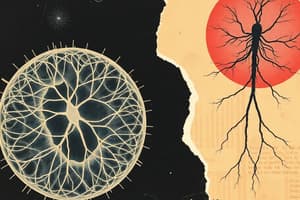Podcast
Questions and Answers
What is the cytoskeleton?
What is the cytoskeleton?
- A simple protein
- Only found in plant cells
- A type of lipid structure
- A complex network of protein filaments that traverse the cell cytoplasm (correct)
What protein is used to create microfilaments?
What protein is used to create microfilaments?
Actin
What are intermediate filaments primarily used for?
What are intermediate filaments primarily used for?
Mechanical strength
What are microtubules made of?
What are microtubules made of?
What is the role of myosin II?
What is the role of myosin II?
Myosin I functions in vesicle transport.
Myosin I functions in vesicle transport.
Which of the following describes treadmilling?
Which of the following describes treadmilling?
What do actin-binding proteins do?
What do actin-binding proteins do?
What is the function of spectrin?
What is the function of spectrin?
Which protein is involved in the bundling of actin filaments?
Which protein is involved in the bundling of actin filaments?
What is gelsolin sensitive to?
What is gelsolin sensitive to?
Thymosin promotes the polymerization of G-actin.
Thymosin promotes the polymerization of G-actin.
What does profilin do?
What does profilin do?
What links spectrin to the cytoplasmic domain of band 3?
What links spectrin to the cytoplasmic domain of band 3?
Hereditary spherocytosis is caused by a mutation in actin.
Hereditary spherocytosis is caused by a mutation in actin.
What type of cells do microvilli increase surface area for?
What type of cells do microvilli increase surface area for?
Flashcards are hidden until you start studying
Study Notes
Cytoskeleton and Its Composition
- The cytoskeleton is a protein filament network within the cell's cytoplasm, crucial for structure and function.
- Microfilaments are primarily composed of actin, providing flexibility and a dynamic structure.
- Intermediate filaments consist of proteins like vimentin and lamin, offering mechanical strength without flexibility.
- Microtubules are large, tubulin-based structures that provide support and shape to the cell.
Actin Filaments and Their Characteristics
- Microfilaments, made of actin and myosin, facilitate various cellular processes including plasma membrane movement.
- F-actin is filamentous actin, while G-actin refers to monomeric actin units; two G-actin molecules form F-actin.
- Actin filaments exhibit polarity, with a slow-growing minus end and a fast-growing plus end.
Actin Dynamics
- Treadmilling describes the process where G-actin is added to the plus end of a filament and simultaneously removed from the minus end, essential for maintaining filament length.
- ATP-bound G-actin is necessary for polymerization into actin filaments.
Regulation by Actin-Binding Proteins
- Various proteins regulate actin dynamics:
- Thymosin prevents G-actin polymerization, maintaining a pool of monomers.
- Profilin facilitates ATP-ADP exchange on actin, promoting filament formation.
- Gelsolin caps the plus end of filaments and can sever them, playing a role in cellular motility.
- Cytochalasins inhibit actin polymerization, halting cell movement.
- Phalloidins bind tightly to actin filaments, preventing depolymerization.
Spectrin and Cell Structure Maintenance
- Spectrin anchors actin filaments to the cell membrane, essential for maintaining the shape of red blood cells.
- Junctional complexes involve spectrin tetramers linked with short actin filaments.
- Ankyrin connects spectrin to membrane proteins, such as band 3, and helps stabilize the connection between membrane and cytoskeleton.
Disorders Related to Cytoskeleton Mutations
- Hereditary spherocytosis results from mutations in ankyrin, causing spherical red blood cells.
- Hereditary elliptocytosis is linked to spectrin mutations that lead to elliptical red blood cells.
- Sickle cell anemia is associated with issues in actin modifications, causing aggregated forms that disrupt normal cell function.
Structural Components of Epithelial Cells
- Microvilli, found on epithelial cells' apical surfaces, enhance surface area and consist of actin filaments bundled by fimbrin and villin.
- The terminal web is a network of actin and associated proteins anchored to the plasma membrane, contributing to cell stability.
Dystrophin and Muscle Function
- Dystrophin is a crucial protein in skeletal muscles, anchoring actin filaments to cell membranes and associated with muscular dystrophy.
Studying That Suits You
Use AI to generate personalized quizzes and flashcards to suit your learning preferences.



